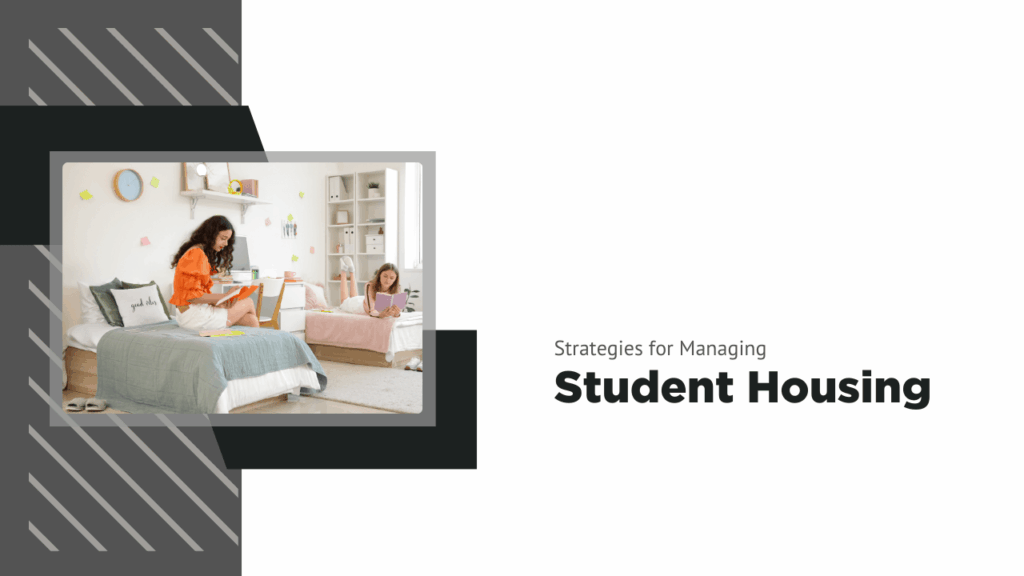
Students can sometimes get an unfair reputation as tenants. A lot of landlords will imagine rowdy parties, forgotten rent payments, and a lot of entitlement among the youth of this particular demographic.
But students today are about more than just TikTok videos and keg parties. In our experience, student housing can be a profitable way to rent out properties. Santa Rosa is home to a number of colleges and universities, including Sonoma State University, Dominican University of California, Empire College, and Franklin University among others. If you’re not renting to students, you’re potentially missing out on a large population of tenants.
Let’s talk about some of the best strategies for managing student housing in Santa Rosa, ensuring you embrace the opportunities while minimizing the risk.
Understand the Unique Nature of Student Housing
Student housing is different from other types of rental properties. For example, lease terms are often shorter. Student tenants will typically rent for 9 to 12 months, aligning with the academic year. This means there’s more turnover and less stability compared to long-term residential tenants. That means higher turnover in some cases. As students graduate or leave for the summer, you will experience some vacancy. This increases the need for quick turnarounds and regular property inspections.
Prepare for roommate situations and group living arrangements. Many students rent in groups to split the rent, which means managing multiple tenants at once. It’s important to establish clear expectations regarding shared spaces, rent payments, and responsibilities.
Identify Well-Qualified Students and Screen Thoroughly
Selecting the right tenants is necessary to succeed with student housing.
But then, tenant selection is important no matter who you’re renting to.
Many landlords make the mistake of not properly screening student tenants due to their perceptions. However, we’ve found that student renters can vary widely in responsibility, reliability, and cleanliness, so it’s essential to perform thorough tenant screening.
Here are a few tips for screening student tenants:
- Require Guarantors. Since many students may not have a long rental history or stable income, it’s a good idea to require a guarantor, who is typically a parent or guardian, to sign the lease agreement. This gives you additional security in case the student fails to pay rent or damages the property. It’s common when you’re renting to students.
- Screen for Financial Stability. While most students may not have full-time employment, checking their financial background can provide insight into their ability to meet their rental obligations. Look for evidence of a reliable income stream, such as parental support or student loans.
- Verify Enrollment. Always verify that your prospective tenants are actively enrolled at the local school. This can prevent you from renting to students who may drop out or leave unexpectedly during the lease term.
Plenty of responsible students are looking to establish a solid and positive rental history.
Set Clear Lease Terms and Expectations
One of the most important steps in managing student housing is setting clear lease terms. With groups of students living together, misunderstandings and disagreements can easily arise if expectations aren’t clearly outlined. A well-written lease agreement will ensure that both you and your tenants are on the same page.
Here are some key points to include in the lease:
- Lease Duration. Specify the exact start and end dates of the lease to match the academic calendar. Include provisions for early termination, especially in case students graduate or leave for internships.
- Rent Payment Terms. Outline how and when rent is to be paid. Many landlords opt for splitting the rent between all tenants in the household to avoid confusion about who owes what. Alternatively, you may want to have one primary tenant responsible for paying rent on behalf of the group.
- Security Deposit and Maintenance. Detail how much the security deposit will be and the expectations for cleaning and property maintenance. Specify how the deposit will be returned after move-out, including any deductions for damages.
- House Rules. Since multiple students often share living space, make sure to include rules for noise levels, cleaning duties, guest policies, and common area usage. Clear guidelines will help mitigate potential conflicts between roommates.
- Responsibilities. Include the responsibilities of both the landlord and the tenants. For instance, landlords should outline maintenance duties, while tenants should be held accountable for keeping the property clean and taking care of any damage.
These are all parts of the lease agreement that would be important no matter who your tenants are. You may have to provide some extra nuance for the specific situations that tenants will find themselves in when they’re students.
Maintain the Property Regularly
Maintaining student housing can be challenging, especially with the high turnover and wear-and-tear that often occurs with younger tenants. However, regular maintenance is crucial to keep your property in top shape and ensure tenant satisfaction.
Inspections will be a big part of protecting and preserving your property. Before the school year begins, inspect your property thoroughly to ensure everything is in working order. Look for any signs of damage or needed repairs, such as broken appliances, leaky faucets, or issues with heating and air conditioning.
When repairs are needed, address them quickly. Students rely on functional living spaces, so it’s important to address any repairs quickly and efficiently. Set up a system for tenants to report issues, and make sure to prioritize urgent fixes (like plumbing or electrical problems). This demographic will likely be more comfortable making maintenance requests online or via text, so setting up for that may be a good idea.
Depending on the type of student housing you offer, consider including essential furnishings such as beds, desks, and couches. This can make your property more attractive to students who are looking for a turnkey rental solution. If you’re renting out a building, ensure that common areas like kitchens, hallways, and bathrooms are regularly cleaned and maintained. Students often neglect these spaces, so it’s important to keep things in good condition to prevent issues like mold or pest infestations.
Protect your investment and your tenant satisfaction with preventative and seasonal maintenance. Check the HVAC system routinely, clean gutters, and service the water heater. Proper maintenance ensures the longevity of your property and prevents issues that could disrupt students’ living experience.
Implement Effective Communication and Conflict Resolution
Student tenants often need clear communication, and you, as a landlord, will need to stay on top of the situation with regular check-ins and transparency. Students may have concerns or complaints about the property, roommates, or neighborhood, and addressing these issues in a timely and professional manner is crucial. When it comes to working with student tenants, we recommend these tips for maintaining strong communication:
- Provide a Consistent Contact Method. Set up a reliable way for tenants to reach you. Many landlords use email, a dedicated phone line, or a property management app. Ensure that students know how to reach you if there’s an emergency or if they need assistance.
- Hold Regular Meetings or Check-Ins. Especially if you manage a multi-tenant property, hold regular check-ins with your tenants to gauge their satisfaction and address any concerns. It also gives you an opportunity to remind them of any rules or upcoming maintenance.
- Conflict Mediation. In shared living spaces, conflicts between tenants are common. If issues arise, it’s important to act as a neutral mediator to resolve disputes. Be prepared to step in if needed and create an environment where students feel comfortable coming to you with problems.
Market Your Property Effectively
To attract high-quality student tenants, you need to market your property well. Since the student rental market is competitive, it’s essential to showcase your property in the best light. We recommend targeting local universities and colleges to find tenants. Advertise on university bulletin boards (physical and digital), housing websites, and social media pages. Many schools also have off-campus housing portals that allow landlords to post listings.
To attract students, offer move-in incentives such as a discounted first month’s rent or free Wi-Fi for the first semester. This can make your property more appealing compared to others. Emphasize features that students look for in a rental, such as proximity to campus, bus routes, parking availability, and local amenities like coffee shops or grocery stores.
Stay Compliant with Laws and Regulations
 Student housing, like all rental properties, is subject to local, state, and federal laws. It’s important to stay informed about regulations regarding lease terms, tenant rights, and property maintenance.
Student housing, like all rental properties, is subject to local, state, and federal laws. It’s important to stay informed about regulations regarding lease terms, tenant rights, and property maintenance.
You’ll want your screening process to be in compliance with fair housing laws, for example, and there are limits to what you can collect as a security deposit. Eviction and rent control laws may also apply to your property, and habitability laws will always be well-enforced.
Managing student housing can be a rewarding investment path, but it requires thoughtful planning, clear communication, and a hands-on approach. By selecting responsible tenants, maintaining the property, setting clear expectations, and staying compliant with laws, you’ll be able to create a positive rental experience for both yourself and your student tenants.
Turning the management over to professionals is always a good idea, especially when it comes to student housing. If you’d like some help or have any questions, please contact us at Prestige Real Estate & Property Management. We manage homes in Sonoma County, including Santa Rosa, Windsor, Sebastopol, Petaluma, and Rohnert Park.
